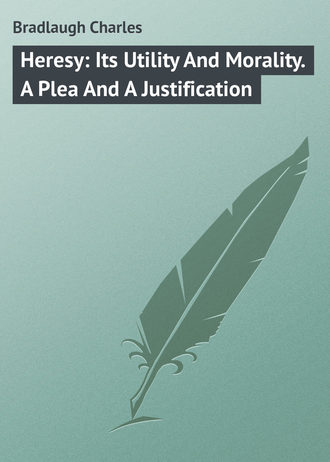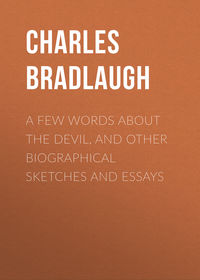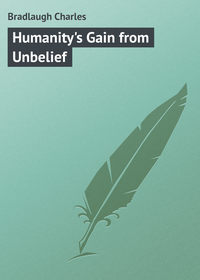 полная версия
полная версияHeresy: Its Utility And Morality. A Plea And A Justification
Charles Prangois Dupuis was born near Chaumont, in France, the 16th Oct., 1742, died 29th Sept., 1809. He played a prominent part in the great revolutionary movement, and was Secretary to the National Convention. His famous work, "L'Origine de tous les Cultes," is one of the grand heresy marks of the eighteenth century. Himself a Pantheist, he searched through the mythic traditions of the Greeks, the Egyptians, the Hindoos, and the Hebrews, and as a result, sought to demonstrate a common origin for all religions. Dr. John Pye Smith classes Dupuis as an Atheist, but this is most certainly an incorrect classification. He did not believe in creation, nor could he go outside the universe to search for its cause, but he regarded God as "la force universelle et eternellement active" and which permeated and animated everything. Dupuis was an example of a new and rapidly increasing class of Freethinking writers – i.e., those who, not content with doubting the divine origin of the religions they attacked, sought to explain the source and progress of the various systems. He urges that all religions find their base in the attempts at personification of some one or other, or of the whole of the forces of the universe, and shows what an important part the sun and moon have been made to play in the Egyptian, Greek, and Hindoo Mythologies. He argues that the fabulous biographies of Hercules, Bacchus, Osiris, Mithra, and Jesus, find their common origin in the sun-worship, thus cloaked and hidden from the vulgar in each country. He does not attack the Hebrew Records as simply inaccurate, but endeavours to show clear Sabaistic foundation for many of the most important narratives. The works of Dupuis and Dulaure should be read together; they contain the most complete amongst the many attempts to trace out the common origins of the various mythologies of the world. In the ninth chapter of Dupuis' great work, he deals with the "fable made upon the sun adored under the name of Christ," "un dieu qui ait mange autrefois sur la terre, et qu'on y mange aujourd'hui," and unquestionably urges strange points of coincidence. It is only astrologically that the 25th of December can be fixed, he argues, as the birthday of Mithra and of Jesus, then born of the celestial Virgin. Our Easter festivities for the resurrection of Jesus, are but another form of the more ancient rejoicings at that season for Adonis, the sun-God, restored to the world after his descent into the lower regions. He recalls that the ancient Druidic worship recognised the Virgin suckling the child, and gathers together many illustrations favourable to his theory. Here we do no more than point out that while reason was rapidly releasing itself from priestly thraldom, heretics were not content to deny the divine origin of Christianity, but sought to trace its mundane or celestial source, and strip it of its fabulous plumage.
Constantine Francis Chassebeuuf Count Volney, born at Craon in Anjou, February 3rd, 1757, died 1820. He was a Deist. In his two great works, "The Ruins of Empires," and "New Researches on Ancient History," he advances many of the views brought forward by Dupuis, from whom he quotes, but his volumes are much more readable than those of the author of the "Origin of all Religions." Volney appears to have been one of the first to popularise many of Spinoza's Biblical criticisms. He denied the Mosaic authorship of the Pentateuch. He wrote most vigorously against kingcraft as well as priestcraft, regarding all systems of monarchy and religion as founded on the ignorance and servility, the superstition and weakness of the people. He puts the following into the mouth of Ma-hommedan priests replying to Christian preachers: "We maintain that your gospel morality is by no means characterised by the perfection you ascribe to it. It is not true that it has introduced into the world new and unknown virtues; for example, the equality of mankind in the eyes of God, and the fraternity and benevolence which are the consequence of this equality, were tenets formerly professed by the sect of Hermetics and Samaneans, from whom you have your descent. As to forgiveness of injuries, it had been taught by the Pagans themselves; but in the latitude you give to it, it ceases to be a virtue, and becomes an immorality and a crime. Your boasted precept, to him that strikes thee on thy right cheek turn the other also, is not only contrary to the feelings of man, but a flagrant violation of every principle of justice; it emboldens the wicked by impunity, degrades the virtuous by the servility to which it subjects them; delivers up the world to disorder and tyranny, and dissolves the bands of society – such is the true spirit of your doctrine. The precepts and parables of your Gospel also never represent God other than as a despot, acting by no rule of equity; than as a partial father treating a debauched and prodigal son with greater favour than his obedient and virtuous children; than as a capricious master giving the same wages to him who has wrought but one hour, as to those who have borne the burthen and heat of the day, and preferring the last comers to the first. In short, your morality throughout is unfriendly to human intercourse; a code of misanthropy calculated to give men a disgust for life and society, and attach them to solitude and celibacy. With respect to the manner in which you have practised your boasted doctrine, we in our turn appeal to the testimony of fact, and ask, was it your evangelical meekness and forbearance which excited those endless wars among your sectaries, those atrocious persecutions of what you call heretics, those crusades against the Arians, the Manichseans, and the Protestants, not to mention those which you have committed against us, nor the sacrilegious associations still subsisting among you, formed of men who have sworn to perpetuate them?1 Was it the charity of your Gospel that led you to exterminate whole nations in America, and to destroy the empires of Mexico and Peru; that makes you still desolate Africa, the inhabitants of which you sell like cattle, notwithstanding the abolition of slavery that you pretend your religion has effected; that makes you ravage India whose domain you usurp; in short, is it charity that has prompted you for three centuries past to disturb the peaceful inhabitants of three continents, the most prudent of whom, those of Japan and China, have been constrained to banish you from their country, that they might escape your chains and recover their domestic tranquillity?"
During the early part of the eighteenth century, magazines and other periodicals began to grow apace, and pamphlets multiplied exceedingly in this country. Addison, Steele, Defoe, and Dean Swift all helped in the work of popular education, and often in a manner probably unanticipated by themselves. Dean Swifts satire against scepticism was fiercely powerful; but his onslaughts against Roman Catholics and Presbyterians made far more sceptics than his other writings had made churchmen.
During the latter portion of the eighteenth century, a new phase of popular progress was exhibited in the comparatively lively interest taken in political questions by the great body of the people inhabiting large towns. In America, France, and England, this was strongly marked; it is however in this country that we find special evidences of the connection between heresy and progress, as contradistinguished from orthodoxy and obstructiveness manifested in the struggle for the liberty of the press and platform; a struggle in which some of the boldest efforts were made by poor and heretical self-taught men. The dying eighteenth century witnessed, in England, repeated instances of State prosecutions, in which the charge of entertaining or advocating the views of the Republican heretic, Paine, formed a prominent feature, and there is little doubt that the efforts of the London Corresponding Society (which the Government of the day made strenuous endeavours to repress) to give circulation to some of Paine's political opinions in Yorkshire, Lancashire, and the North, had for result the familiarising many men with views they would have otherwise feared to investigate. The step from the "Rights of Man" to the "Age of Reason" was but a short stride for an advancing inquirer. In France the end of the eighteenth century was marked by a frightful convulsion. A people starved and degraded for generations, rose in the very desperation of despair, and with a mighty force broke the yoke of traditional feudalism and habitual monarchic reverence; but in the case of France, the revolution was too sudden to be immediately beneficial or enduring, the people were as a mass too poor, and therefore too ignorant to wield the power so rapidly wrested from the class who had so long monopolised it. It is far better to grow out of a creed by the sure and gradual consciousness of the truths of existence, than to dash off a religious garb simply from abhorrence of the shameful practices of its professors, or sudden conviction of the falsity of many of the testimonies in its favour. So it is a more permanent and more complete revolution which is effectuated by educating men to a sense of the majesty and worth of true manhood, than is any mere sudden overturning a rotten or cruel usurpation. Monarchies are most thoroughly and entirely destroyed – not by pulling down the throne, or by decapitating the king, but by educating and building up with a knowledge of political duty, each individual citizen amongst the people.
It is here that heresy has its great advantage. Christianity says, "the powers that be are ordained of God, he that resisteth the power resisteth the ordinance of God." Heresy challenges the divine right of the governor, and declares that government should be the best contrivance of national wisdom to promote the national weal, to provide against national want, and alleviate-national suffering – that government which is only a costly machinery for conserving class privileges, and preventing popular freedom, is a tyrannical usurpation of power, which it is the duty of true men to destroy.
I have briefly and imperfectly alluded to a few of the men who stand out as the sign-posts of heretical progress during the sixteenth, seventeenth, and eighteenth centuries; in some future publication of wider scope fairer tribute may be paid to the memories of some of these mighty warriors in the Freethought army. My object is to show that the civilisation of the masses is in proportion to the spread of heresy amongst them, that its effect is seen in an exhibition of manly dignity and self-reliant effort which is utterly unattainable amongst a superstitious people. Look at the lazzaroni of the Neapolitan States, or the peasant of the Campagna, and you have at once the fearful illustration of demoralisation by faith in the beggar, brigand, and believer.
It is sometimes pretended that such advantages of education and position as the people may boast in England, their civil rights and social advancement, are owing to their Christianity, but in point of fact the reverse is the case. For centuries Christianity had done little but fetter tightly the masses to Church and Crown, to Priest and Baron; the enfranchisement is comparatively modern. Even in this very day, in the districts where the people are entirely in the hands of the clergy of the Established Church, there they are as a mass the most depraved. Take the agricultural counties and the agricultural labourers: there are no heretical books or papers to be seen in their cottages, no heretical speakers come amongst them to disturb their contentment; the deputy-lieutenant, the squire, and the rector wield supreme authority – the parish church has no rival. But what are the people as a mass? They are not men, they are not women, they lack men's and women's thoughts and aspirations: they are diggers and weeders, hedgers and ditchers, ploughmen and carters; they are taught to be content with the state of life, in which it has pleased God to place them.
My plea is, that modern heresy, from Spinoza to Mill, has given brain-strength and dignity to every one it has permeated – that the popular propagandists of this heresy, from Bruno to Carlile, have been the true redeemers and saviours, the true educators of the people. The redemption is yet only at its commencement, the education only lately begun, but the change is traceable already; as witness the power to speak and write, and the ability to listen and read, which have grown amongst the masses during the last 100 years. And if to-day we write with higher hope, it is because the right to speak and the right to print has been partly freed from the fetters forged through long generations of intellect-prostration, and almost entirely freed from the statutory limitations which, under pretence of checking blasphemy and sedition, have really gagged honest speech against Pope and Emperor, against Church and Throne.
1
The oath taken by the Knights of the Order of Malta is to
kill, or make the Mahometans prisoners, for the glory of
God.










